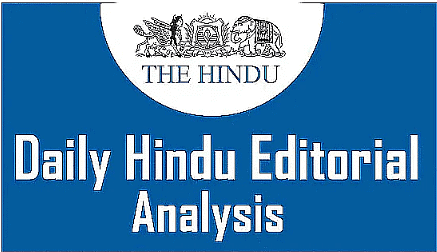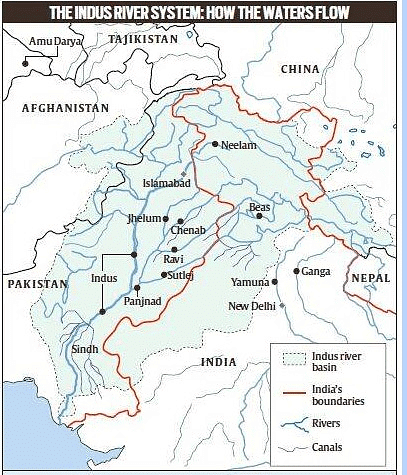UPSC Exam > UPSC Notes > Current Affairs & Hindu Analysis: Daily, Weekly & Monthly > The Hindu Editorial Analysis- 31st January 2023
The Hindu Editorial Analysis- 31st January 2023 | Current Affairs & Hindu Analysis: Daily, Weekly & Monthly - UPSC PDF Download

Water Woes
Why in News?
India announced that it wants to modify the 62-year-old Indus Water Treaty (IWT) with Pakistan.Why India issued notice to Pakistan?
- Unsolicited disputes over Indian hydel projects: India cited Pakistan’s intransigence in resolving disputes over the Kishenganga and Ratle hydropower projects, both in Jammu and Kashmir.
- Dragging arbitration: India protested Pakistan’s “unilateral” decision to approach a court of arbitration at The Hague.
- A foul cry: Pakistan’s move to push the World Bank for a Court of Arbitration ran counter to the pre-existing channel of dispute resolution through a “neutral expert” appointed by the World Bank.
- Renegotiating IWT: The decision to issue notice to Pakistan is a major step and could lead to the unravelling and renegotiation of the water sharing treaty.

- Pakistan had first raised objections to India’s construction of the 330 MW Kishenganga hydroelectric project on the Jhelum river back in 2006.
- It then objected to plans to construct the 850 MW Ratle Hydroelectric Project on the Chenab river as well.
- Both India and Pakistan differred on whether the technical details of the hydel projects conformed with the treaty, given that the Jhelum and Chenab were part of the “western tributaries”.
- The Indus Waters Treaty is a water-distribution treaty between India and Pakistan, brokered by the World Bank signed in Karachi in 1960.
- According to this agreement, control over the water flowing in three “eastern” rivers of India — the Beas, the Ravi and the Sutlej was given to India
- The control over the water flowing in three “western” rivers of India — the Indus, the Chenab and the Jhelum was given to Pakistan.
Basis of the treaty
- Equitable water-sharing: Back in time, partitioning the Indus rivers system was inevitable after the Partition of India in 1947.
- Empathizing the Partition: The sharing formula devised after prolonged negotiations sliced the Indus system into two halves.
- Mostly favours Pakistan: Equitable it may have seemed, but the fact remained that India conceded 80.52 percent of the aggregate water flows in the Indus system to Pakistan.
- Unnecessarily generous: It also gave Rs 83 crore in pounds sterling to Pakistan to help build replacement canals from the western rivers. Such generosity is unusual of an upper riparian.
- Reclaiming riparian rights: India conceded its upper riparian position on the western rivers for the complete rights on the eastern rivers. Water was critical for India’s development plans.
- Limited irrigation: The treaty allowed India to use western rivers water for limited irrigation use.
- Unrestricted commercial use: It gave powers for unrestricted use for power generation, domestic industrial and non-consumptive uses such as navigation, floating of property, fish culture, etc.
- Hydel projects: It lays down precise regulations to build any water or hydel projects.
- Addressing Pak’s concerns: The pact also gives the right to Pakistan to raise objections to designs of Indian hydroelectric projects on the western rivers.
Significance of the treaty
- Testimonial to peaceful coexistence: It is a treaty that is often cited as an example of the possibilities of peaceful coexistence that exist despite the troubled relationship.
- Survived many hostilities: It has survived 3 crucial wars.
- Most successful bilateral treaty: It is internationally regarded as an example of successful conflict resolution between two countries otherwise locked in a hostile relationship.
- India’s generosity: It is for India’s generosity on Pakistan for sharing waters of its own rivers.
- Free flow of waters: India has refrained from weaponizing waters. Pakistan cannot survive without this treaty.
- Huge dependence Pak economy: About 80% of Pakistan’s agriculture depends on Indus and the riparian rivers waters.
- Humanitarian grounds: Floods and droughts will starve ordinary Pakistanis while their politicians would still live in luxury.
- India’s credibility: Backtracking on the treaty could affect India’s stand as global reliable partner who disrespects bilateral agreements.
- Blow of terroristan: PM Modi’s words hold relevance that “Blood and waters cannot flow together”.
- A tit for tat: If India wants, it can either flood or drought-starve Pakistan by not obligating to this treaty.
- The role of India, as a responsible upper riparian abiding by the provisions of the treaty, has been remarkable.
- However, India needs to rethink or re-negotiate this treaty.
- Just like water affects ordinary Pakistanis, so does terrorism affects Indians.
The document The Hindu Editorial Analysis- 31st January 2023 | Current Affairs & Hindu Analysis: Daily, Weekly & Monthly - UPSC is a part of the UPSC Course Current Affairs & Hindu Analysis: Daily, Weekly & Monthly.
All you need of UPSC at this link: UPSC
|
38 videos|5288 docs|1117 tests
|
Related Searches
















